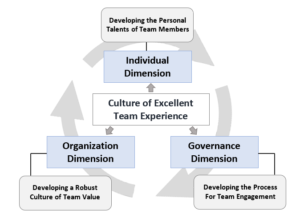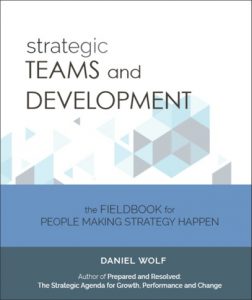Strategic Teams – The Advantages of Experience
What makes a team effective? What makes a team capable, resilient, adaptive, responsive, durable and productive? What makes a team strong enough for the toughest challenges, smart enough to sense change, savvy enough to engage in the hardest choices? The answer to most of these and related questions is the singular but complex theme we call team experience. The advantage of team experience accrues in many ways.
The Dimensions of Team Experience
There are three dimensions of strategic team experience, and each plays a powerful role in development. The individual dimension speaks to the talents and behaviors of team members, their strengths, character, motivation and behaviors. The governance dimension involves the leadership and management of team performance, with planning and decision making, with progress mapping and accountability. The organization dimension speaks to the broader competence and capacity of the enterprise relative to growth, performance and change objectives. These are drivers of strategic and economic value. They shape the comparative advantages of team experience across the enterprise, and the marketplace.
Experience and Team Development
Experience in Strategic Teams and Development is subject to good design, processes, focus and a certain level of discipline and tension. Our research for the SC/24 Project and Strategic Teams and Development suggests the importance of an orderly and practice-driven approach to team curation. Consider:
Developing individual talent to function as a valuable team member is one part assessment, one part coaching and support, and one part advancement, always gaining more experience. Developing the governance of strategic teams requires immersion in the strategic agenda to build a deep sense of intention, and the roadmap for performance and accountability.
Developing the organization’s base of team competence and capacity is the broader intent of experience. The evolution of “dual-dynamic” teams that can morph with the organization’s challenges is the ultimate goal of Strategic Teams and Development, reflecting upon the bigger stage, the real deal of teams that excel in making strategy happen.
Where to Go with Team Experience
High performance teams are built and sustained through experience, as we define it above, with three dimensions. For the “right approach” to development, consider:
- Start with the End in Mind
What is necessary and required to meet the basic challenges and objectives of the broader enterprise, near-term and long-term?
- Look at Teams as the Agents for Making Strategy Happen
What functional and behavioral attributes will enable the teams of the enterprise to drive growth, performance and change?
- Establish the Ground Rules and the Processes for Team Function
What forward planning, decision making, risk management and problem solving practices are the “right ones” for these teams?
- Practice, and Build Experience-Based Practice as Culture
Practice may never make perfect, but it builds team readiness and resolve, the essential drivers of people making strategy happen.
Few teams are “drafted to excellence” based on individual talent alone. The best teams in the most effective organizations are built by addressing these three dimensions of experience, with focus, and with purpose.
The ideas defined above are the subject of our new fieldbook entitled Strategic Teams and Development planned for release early next year. The fieldbook is designed as a resource for individuals and teams at every level of the enterprise. From every angle, Strategic Teams and Development speaks to the ideas that contribute to better, stronger, smarter, faster teams that are focused on results and on making strategy happen, taking care of today and getting ready for tomorrow.
Daniel Wolf is the President of Dewar Sloan, a consulting group with expertise in strategy and governance. He is the author of Strategic Teams and Development — as well as Prepared and Resolved: The Strategic Agenda for Growth, Performance and Change.





Sorry, the comment form is closed at this time.